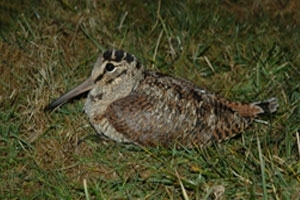 The Game & Wildlife Conservation Trust (GWCT) is encouraging birdwatchers across the UK to count their local Woodcock from now until 30 June. There has been a worrying decline in the numbers of breeding Woodcock over the last 40 years and, throughout May and June, the GWCT and the British Trust for Ornithology (BTO) are working together to raise awareness of our native Woodcock numbers.
The Game & Wildlife Conservation Trust (GWCT) is encouraging birdwatchers across the UK to count their local Woodcock from now until 30 June. There has been a worrying decline in the numbers of breeding Woodcock over the last 40 years and, throughout May and June, the GWCT and the British Trust for Ornithology (BTO) are working together to raise awareness of our native Woodcock numbers.
“There are likely to be a number of factors contributing to the decline, from changing habitat to increasing predation.” explains Dr Andrew Hoodless, Head of Wetland Research at the GWCT. “Ongoing monitoring is essential to help us understand annual fluctuations in numbers and assess the trend. The more volunteers who are willing to help out, the more accurate a picture we will obtain. We are asking birdwatchers to help us with this year’s survey by making three counts at dusk of displaying males.”
The Woodcock, being largely nocturnal, can be hard to spot. However, males conduct a distinctive courtship flight, accompanied by a shrill call, known as ‘roding’ at dawn or dusk.

Surveys of the male Woodcock show that following a period of relative stability, between 2009 and 2014, numbers dropped in 2015 and we now have about 55,000 breeding males in Britain. Given this trend, it is essential that the counts continue, and greater participation will help to reduce the errors around annual estimates. Key areas in the UK where counting is urgently needed include Norfolk, Yorkshire, Northumberland, North Wales and Scotland.
Dr Hoodless concludes: “We are very grateful to all the surveyors who have already taken part in our annual Woodcock surveys and would urge you to continue.”
For full details of how to take part see www.bto.org/volunteer-surveys/woodcock-survey. To learn more about current research on breeding Woodcock visit www.woodcockwatch.com/tracking-woodcock/tracking-breeding-woodcock/
Notes to editors
The Game & Wildlife Conservation Trust – providing research-led conservation for a thriving countryside. The GWCT is an independent wildlife conservation charity which has carried out scientific research into Britain’s game and wildlife since the 1930s. We advise farmers and landowners on improving wildlife habitats. We employ more than 60 post-doctoral scientists and other research staff with expertise in areas such as birds, insects, mammals, farming, fish and statistics. We undertake our own research as well as projects funded by contract and grant-aid from government and private bodies.
For information, contact:
Eleanor Williams
Telephone: 07592 025476
Email: press@gwct.org.uk